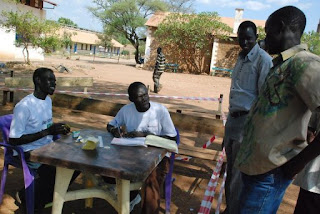Washington DC — While President Obama was delivering his first State of the Union address January 27, thousands of Americans went online and submitted their own questions via the popular video Web site YouTube.
People could also vote on the 11,000 questions that were sent in, and on February 1, Obama — who had not seen them in advance — responded to the questions with the highest approval ratings. His responses streamed live from the White House.
Some of the questions Obama dealt with in the first-ever presidential YouTube interview were addressed in his State of the Union speech as well: health care, jobs, the financial crisis, terrorism and Afghanistan. But the top vote-getter in terms of the percentage who thought it a good question — more than 90 percent — had to do with Sudan, a topic not addressed in his speech.
U.S. WORKING FOR LASTING PEACE AGREEMENT IN SUDAN
Asked what he would do to ensure that widespread violence does not occur in Sudan this year, the president replied, “The situation in Sudan has been heartbreaking but also extremely difficult.”
He said he began working from the day he came into office to ensure that people in refugee camps in Darfur had access to water, food and other necessities of life and that nongovernmental assistance organizations could return.
“The next step in the challenge is to broker a lasting peace agreement between rebels who are still in the Darfur region and [the Sudanese] government,” Obama explained, noting that his special envoy on Sudan, Scott Gration, was trying to bring together the international community “to get that deal brokered.”
The aim, Obama said, is “a series of agreements that would stabilize the country, and then allow the refugees who are in Darfur to start moving back to their historic lands.”
“Sadly, because of the genocide that took place earlier, a lot of those villages are now destroyed. And so thinking about how to resettle these populations in places that are viable economically, that have the resources to support populations, is a long-term development challenge that the international community is going to have to support.”
The United States continues “to put pressure on the Sudanese government,” Obama said. ”If they are not cooperative in these efforts, then it is going to be appropriate for us to conclude that engagement doesn’t work, and we’re going to have to apply additional pressure on Sudan in order to achieve our objectives.”
“WE ARE AT WAR AGAINST A VERY SPECIFIC GROUP”
Asked about his plans for the “war on terror” and the threat of terrorism, Obama began by re-defining who the enemy is: not an abstraction like “terror” but “a very specific group — al-Qaida and its extremist allies that have metastasized around the globe, that would attack us, attack our allies, attack bases and embassies around the world, and most sadly, attack innocent people regardless of their backgrounds, regardless of their religions.”
“We have to fight them in very concrete ways in Afghanistan and along the border regions of Pakistan where they are still holed up,” Obama said. “They have spread to places like Yemen and Somalia, and we are working internationally with partners to try to limit their scope of operations and dismantle them in those regions.”
“But we also have to battle them with ideas,” Obama continued. “We have to … work with the overwhelming majority of Muslims who reject senseless violence of this sort, and to work to provide different pathways and different alternatives for people expressing whatever policy differences that they may have. And I think we haven’t done as good of a job on that front.”
Obama also spoke of the need to help countries such as Yemen and Pakistan economically, “to make sure that young people there have opportunity.”
Plans to close the detention facility at Guantánamo Bay have met “a lot of political resistance,” Obama said. “It’s been one of those things that’s been subject to a lot of, in some cases, pretty rank politics.”
Noting that Congress can constrain his ability to move the prisoners held at Guantánamo by refusing to allocate funds for new facilities, Obama said, “This is something that we’ve got to work through … in Congress, but also with public opinion so that people understand that ultimately this is the right thing to do.”
On energy, the president repeated his support for solar, wind and other alternative energy sources, but added that those sources could not meet the nation’s energy needs. He urged Americans to look at the successful nuclear power programs in Japan and France. “We’re mindful of the concerns about storage, of spent fuel, and concerns about security, but we still think [nuclear energy is] the right thing to do if we’re serious about dealing with climate change.”
He also called for research into clean-coal technology because countries like China and India are not going to stop using coal and the world will need the technology to deal with its use in an environmentally responsible way.
At the end of the session, Obama expressed enthusiasm for the Internet as a way of hearing from and talking with the public. “This was terrific,” he said. “I hope we get a chance to do this on a more regular basis because it gives me great access to all the people out there with wonderful ideas.”
The full text of the interview is available on America.gov. The video is available on the White House Web site
Source:media-newswire.com




